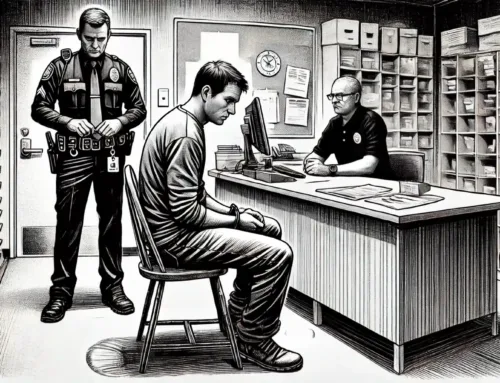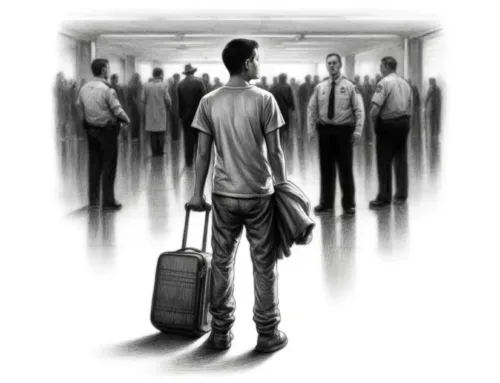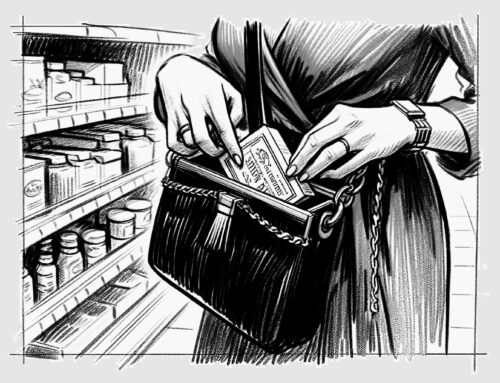Consequences of a Theft Conviction in Florida
Being charged with a theft crime can lead to devastating consequences that can negatively impact your life for years. If convicted of theft in Florida, even a seemingly minor charge, you may face substantial fines, probation or community service requirements, permanent criminal record, and possibly even jail time. Understanding these severe penalties is critical to know what’s at stake if convicted.
Jail Time Means Losing Your Freedom
While not as likely for petit theft or a first offense, Florida judges can sentence up to five years in prison for a third-degree grand theft felony or up to 30 years for a first-degree grand theft felony, depending on the severity and value stolen (Section 812.014(2)). Even just two weeks behind bars means losing your job, car, home, and separation from family.
And a felony conviction stays on your record for the rest of your life, causing lost opportunities and stigma. The possibility of jail time makes fighting the charges critical.
Probation and Community Service Burden Your Freedom
Judges frequently impose 12+ months of supervised probation for theft convictions. You’d have regular meetings with an officer, random drug tests, restrictions on leaving the county or state without permission, and other strict terms. Violating any condition means jail time.
Community service is also commonly ordered, requiring possibly hundreds of hours of unpaid work. These extra burdens make it extremely hard to maintain a normal life and career. And they’re rarely just forgotten obligations after “doing your time.”
Fines and Court Costs Add Up Quickly
The fines associated with a theft conviction vary based on the value of property stolen and your prior record. Petit theft under $750 is a misdemeanor with a maximum $1,000 fine (Section 812.014(3)(a)). Between $750 and $5,000 stolen becomes a third-degree felony with a maximum $5,000 fine (Section 812.014(2)(c)1). The fines quickly add up to thousands of dollars for higher-value theft.
You also face hundreds more in court costs, fees, and other expenses on top of fines. Have you totaled up what a theft conviction may cost you if pleading guilty or convicted at trial? It’s wise to consult an attorney to understand the full financial liability before deciding how to proceed with fighting your charges.
Permanent Criminal Record Limits Opportunities
After a theft conviction, you have a permanent adult criminal record absent record sealing or expungement. This criminal record appears on routine background checks by employers, apartments, schools, the military, government agencies, banks, or volunteer groups.
A theft crime on record leads to lost job opportunities, housing denials, educational setbacks, military service barriers, and a general lack of trust or wariness from others. Your overall life prospects suffer considerably.
Employment and Career Harm from Theft Charges
A theft crime on your record severely hinders job and career opportunities across Florida. Most employers now run criminal background checks on all job applicants during hiring screening. When a larceny, shoplifting, or fraud offense appears, you instantly get filtered out and denied employment in most places.
Even companies that don’t automatically disqualify applicants with theft convictions are usually reluctant to hire someone with proven “dishonesty.” They don’t want to risk an employee stealing from customers or clients or pilfering sensitive information. Or they fear you may steal inventory, office supplies, or funds from the company itself.
Finding any job to support yourself and your family becomes extremely difficult. You may be limited to manual labor, food service, retail, or shift work with high turnover rates. Many higher-paying skilled trade, corporate, medical, financial, and government jobs are likely off-limits. And you can face not getting hired, even for volunteer roles.
Struggling with perpetual unemployment after serving your sentence leads many down a path back to crime out of desperation. Avoiding a conviction through an acquittal at trial or a negotiated diversion program is essential. We have achieved dismissal of charges, dispositions withholding adjudication, and pre-trial diversion programs for clients to specifically prevent damage to employment prospects.
Theft Crimes Restrict Your Housing Options
Finding stable housing becomes extremely difficult with a theft conviction on your record. Most landlords now conduct criminal background checks prior to leasing apartments or homes for rent. A petit theft or grand theft offense showing up frequently leads to the denial of rental applications.
Landlords consider applicants with theft crimes high risk for non-payment, property damage, or disturbing other tenants. Some explicitly exclude applicants with a theft conviction in their tenant screening criteria. Certain government-subsidized housing programs also prohibit participants from having specific criminal records.
Even if you still qualify to rent somewhere, choices become much more limited, and you’ll likely pay higher rent or deposits. Neighborhoods with cheaper rent prices tend to screen less strictly. But they frequently come with more crime, drugs, violence, and blight conditions.
Owning a home could also be impacted if you can’t qualify for a mortgage or homeowners insurance after a theft conviction. While it may not completely bar you from renting or buying, having to put down higher deposits or extra rent upfront can delay achieving stable housing.
Losing access to safe, affordable housing options strains individuals and families incredibly. Avoiding a theft conviction by engaging an experienced criminal defense lawyer to fight the charges aggressively from the start is imperative.
Theft Crimes Restrict Access to Banks and Loans
Banks and other financial institutions conduct extensive background checks before approving new bank accounts, credit cards, car loans, and mortgages. They want to mitigate the perceived risks of clients defaulting on debts or potentially defrauding services. Theft crimes like petit theft, identity theft, and check fraud signal future “risk,” even if only one past mistake.
Following a conviction, you may discover sudden account closures, rejected applications for basic checking/savings accounts, and denials for auto financing or home loans, even with sizable down payments. Interest rates can also spike on existing credit lines to compensate for elevated risk tolerance.
Without access to traditional financial tools like direct deposit, debit cards, online bill pay, and electronic transfers, basic functions of society, like securing housing, transportation, and employment, become exponentially harder, especially with cash-only restrictions. Rebuilding credit relevance takes years after derogatory marks hit reports tied to the closure of long-held accounts.
Our firm knows theft convictions can plague a person for a lifetime. We work extremely hard to negotiate charge reductions, deferred prosecutions, and avoidance of pleas that require admissions whenever possible to avoid negative consequences.
Theft Crimes Can End Military Service and Veterans Benefits
A theft conviction often means immediate discharge and separation from service for active duty military members. Commanders have wide authority to pursue court martial or administrative separations for personnel who commit crimes like larceny, shoplifting, or fraud during their enlistment.
Many enlisted with hopes of lifelong stable careers get those plans shattered. Due to an avoidable mistake, they lose salaries, housing, health benefits, and promised pensions/retirement pay. The collateral impacts also extend to spouses and children depending on the former service member.
Even those already honorably discharged face barriers to enrolling in higher education, obtaining healthcare, and securing well-paying jobs through the VA and GI Bill if convicted of theft crimes afterward. Accessing much-needed counseling, disability benefits, and small business loans requires extensive background checks as a prior service member.
We have successfully defended current and former military clients. This has helped many avoid the most severe consequences to their post-military lives and benefits after mistakes in civilian life. Let our firm’s experience with military criminal justice procedures protect everything you’ve worked for during and after serving our country. The stakes are too high here not to engage knowledgeable legal counsel upfront.
Theft Crimes Can Derail Higher Education Goals
If you aspire to attend college or graduate school, a theft conviction makes achieving them more difficult. Educational institutions commonly request disclosure and review of applicant criminal records during admissions screening.
Seeing petit theft, retail fraud, or any larceny offense will often prompt universities and vocational schools to instantly reject your application. Academic admission boards perceive those with theft crimes as risky students more likely to violate codes of conduct by stealing exams, plagiarizing papers, or improperly accessing administrative systems.
Some state licensing requirements in fields like nursing, accounting, education, counseling, and others also mandate disclosure of all criminal offenses. They allow the denial of occupational licenses for crimes involving “moral turpitude,” which clearly encompasses theft. This bars many professional careers necessitating government licensing, even if you successfully earn the degree.
Additionally, those convicted of felony theft charges become ineligible for federal student financial aid for periods of time. Completing higher education is practically impossible without access to grants, loans, and work-study assistance that most undergrads depend on. This has cascading long-term effects on overall career and wage prospects over a lifetime without that level of education.
By zealously contesting theft cases from arrest through trial, we help clients achieve dispositions in their cases to prevent education barriers. Let us leverage our substantial criminal litigation experience to keep your academic and career aspirations intact.
Theft Convictions Can Lock You Out of Government Services
Beyond just difficulty finding jobs and housing, a theft conviction also restricts access to critical health and public assistance programs administered by governmental agencies in Florida. These include Medicaid, Children’s Health Insurance (CHIP), Temporary Assistance for Needy Families (TANF), Supplemental Nutrition Assistance Program (SNAP) and subsidized childcare benefits.
While specific policies vary between agencies and counties, many prohibit enrollment or terminate existing benefits for those with larceny convictions. The logic argues that if you’ve stolen before, you can’t be trusted to provide accurate reporting on applications for income, expenses, and qualifying dependents. However, it frequently punishes those in legitimate need who cannot work and support families without conviction.
Additionally, theft charges prompt delays in processing applications or reviewing eligibility for other state licenses like driver, professional, recreational, and concealed weapons permits until case outcome. Those ultimately convicted then get denied renewing permits they depend on for occupations, healthcare access, and exercising constitutional rights.
Theft Convictions Restrict Volunteer Opportunities
Even volunteer opportunities typically sought by those aiming to rebuild reputations and contribute positively back to their communities following criminal cases can become largely unattainable for those with certain theft convictions.
Organizations like Big Brothers Big Sisters, Habitat for Humanity, United Way, soup kitchens, shelters, religious centers, and nearly all nonprofits working with vulnerable groups or sensitive data now uniformly conduct background checks on new volunteer applicants. Seeing petit theft, fraud or any larceny offenses often leads to instant disqualification from consideration for liability reasons.
These groups cannot risk someone with a history of stealing, potentially victimizing the very populations they aim to serve, or misusing funds/resources entrusted to support charitable causes. So opportunities to mentor disadvantaged youth, build homes for the homeless, deliver meals to underprivileged families, and engage in similar redeeming roles rarely get granted to those simply hoping to turn their lives around after regrettable mistakes tied to theft.
Other Negative Consequences of a Theft Conviction
Impact on Family Life
A theft conviction doesn’t just affect the individual but also the family members who depend on them. It can disrupt child custody and visitation rights if the other parent uses it to claim poor judgment. Children often get stigmatized for a parent’s crime. And a jail sentence traumatizes kids and deprives them of essential emotional support.
Civil Lawsuits and Garnished Wages
Victims retain the right to pursue civil lawsuits for additional monetary damages following a criminal theft case. While evidence standards differ between civil and criminal law, a conviction provides persuasive indications of liability in parallel civil litigation. Significant percentages of wages can get garnished to satisfy judgments.
Suspended Driver’s License
For crimes involving stolen vehicles or fuel theft, judges frequently order license suspension, even for first offenses. This severely restricts legal transportation options to commute to work or drive family members to appointments. Suspensions typically last one to five years for theft convictions specifically.
Barriers to Travel Abroad
Those convicted of theft crimes face extensive questioning and enhanced screenings going through immigration when traveling internationally. Some countries even outright ban visitors with theft records from obtaining travel visas or deny entry once flights land. This bars vacations, business trips, and attending significant family events.
Immigration Consequences for Non-Citizens
For non-citizens, a theft conviction can trigger some of the most severe immigration penalties legally permitted, including deportation, detention, and family separation. Under the Immigration and Nationality Act (INA) and Board of Immigration Appeals precedent, offenses like theft, retail fraud, and grand theft can be classified as:
- Aggravated Felonies – Rendering the non-citizen deportable and ineligible for most waivers or future immigration benefits, regardless of lawful status
- Crimes Involving Moral Turpitude (CIMT) – Barring re-entry to the US after international travel as well as denying future green card/visa petitions
- Crimes of Theft or Burglary – Which invalidate and terminate current protected statuses like DACA, TPS, or asylum
Additionally, those without lawful status can face mandatory detention throughout removal proceedings without the possibility of bond after a theft conviction. This means months to years confined in prison-like ICE facilities, separated from family while awaiting court hearings.
The immigration penalties stem from the resulting criminal sentences and the original theft conviction on record. Even misdemeanors can cause inadmissibility and visa denials. Only an experienced criminal attorney has the skill to negotiate charges and pleas to avoid negative immigration outcomes. The stakes are extremely high for those not born here.
Don’t Let a Theft Charge Ruin Your Life – Fight Back Now
Given the extremely serious potential consequences of a theft conviction, working with an experienced criminal defense attorney gives you the best chance to avoid them. An attorney aggressively challenges questionable evidence and legal issues, negotiates for reduced charges or diversion programs, and may even get charges dismissed pre-trial.
Through meticulous case investigation and assertive negotiation tactics, we have achieved charges dropped, reduced charges, probation, diversion programs, and avoidance of convictions and jail for countless clients. But time is truly of the essence…
CALL US NOW for a CONFIDENTIAL INITIAL CONSULTATION at (305) 538-4545, or take a moment to fill out our confidential and secure intake form.* The additional details you provide will greatly assist us in responding to your inquiry.
*Due to the large number of people who contact our law office requesting our assistance, it is strongly suggested that you take the time to provide us with specific details regarding your case by filling out our confidential and secure intake form. The additional details you provide will greatly assist us in responding to your inquiry promptly and appropriately.
THERE ARE THOUSANDS OF LAW FIRMS AND ATTORNEYS IN SOUTH FLORIDA. ALWAYS INVESTIGATE A LAWYER’S QUALIFICATIONS AND EXPERIENCE BEFORE MAKING A DECISION ON HIRING A CRIMINAL DEFENSE ATTORNEY ATTORNEY FOR YOUR MIAMI-DADE COUNTY CASE









